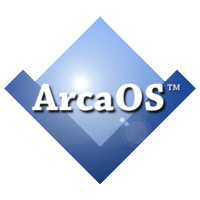Work continues at a furious pace behind the scenes at Arca Noae! Sometimes, a lot of work is needed before any highly visible releases are done, so we thought it might be a good idea to provide periodic progress reports so everyone can see just how much work is being done. Here’s the first in the series.
Device drivers
Work is continuing on Panorama. There have been improvements in monitor detection. Our developers and dedicated beta testers discovered some issues on some systems with different EDID types. Other changes to the Panorama PMI have improved compatibility with more systems. Watch for a new release in the near future, and of course, in the upcoming ArcaOS 5.0.4.
The ACPI project continues to get improvements. In addition to the regular updates for ACPICA, there has been work needed to fix some minor issues, increasing compatibility over a wider range of systems.
The AHCI driver received some improvements to help protect non-MBR disks from accidental damage.
A lot of progress has been made on USB3. We now have a driver that mostly works but still needs further refining before it is ready for alpha testing.
Kernel and boot environment
Work has recently begun to investigate booting of ArcaOS on UEFI-based systems without a vendor-supplied Compatibility Support Module (CSM). Watch for further updates on this project. Early indications are very positive for this critical component, necessary to support the latest generation of hardware.
ArcaOS 5.0.4
A lot of work has gone into getting the next release of ArcaOS ready. Our next progress update will focus on this, but the biggest news to share is that thanks to our new Update Facility, bringing any version of ArcaOS 5.0 up to date will be a snap: no more reformatting and reinstalling! Instead, just boot from the installation disc, ISO, or USB flash drive, select the ArcaOS installation to be updated, and allow the process to complete.
A lot of work has gone into Installer fixes and improvements, too. For new installations, the process has never been easier or more trouble-free.
Outside development
Most of our developers also do their own things, away from ArcaOS. Most of these projects find their way into ArcaOS or into the Arca Noae software repositories in some form or fashion. Here are a couple of notable things seeing active development.
Several years ago, Alex Taylor, our Chief UI Architect, began work on a replacement utility for the graphical LVM (Logical Volume Manager) Java applet. Alex has recently returned to that work, and the latest beta is looking promising for inclusion in ArcaOS 5.1.
Alex has also spent some time working on not only the ConfigApps utility which associates various internet applications with the Workplace Shell, and has contributed some new work for NewView, the help and INF viewer. Source code for both of these may be viewed and checked out of the Netlabs NewView project repository.
Consulting and development for commercial clients
We have spent a lot of time in recent months working on some custom projects for commercial clients. Not only does this work help fund ongoing development for many of the projects mentioned above, but many new things come out of this work to benefit all users of the platform.
Ongoing subscription service and support
We work tirelessly to provide professional, courteous, and knowledgeable technical support for the software we produce and distribute. Sometimes, this support uncovers bugs which we work quickly to address, other times, we find that documentation could be improved, and in some cases, we discover hardware which may require some software modification to support (or which we may determine to be unsuitable for ArcaOS). We offer two levels of support: personal and commercial, where commercial subscribers receive priority attention. Still, we do our best to see that everyone’s needs are addressed.
As a reminder, when considering opening a new trouble ticket, it’s a good idea to re-read our ticket guidelines and Best Practices page, and be sure to search for similar issues in our bug tracker. If a ticket is indeed necessary, we generally will require a TestLog log file, so be sure to follow the directions here to get the latest TestLog build, first. You may attach a log file at the time of opening the ticket, saving time in the process.
